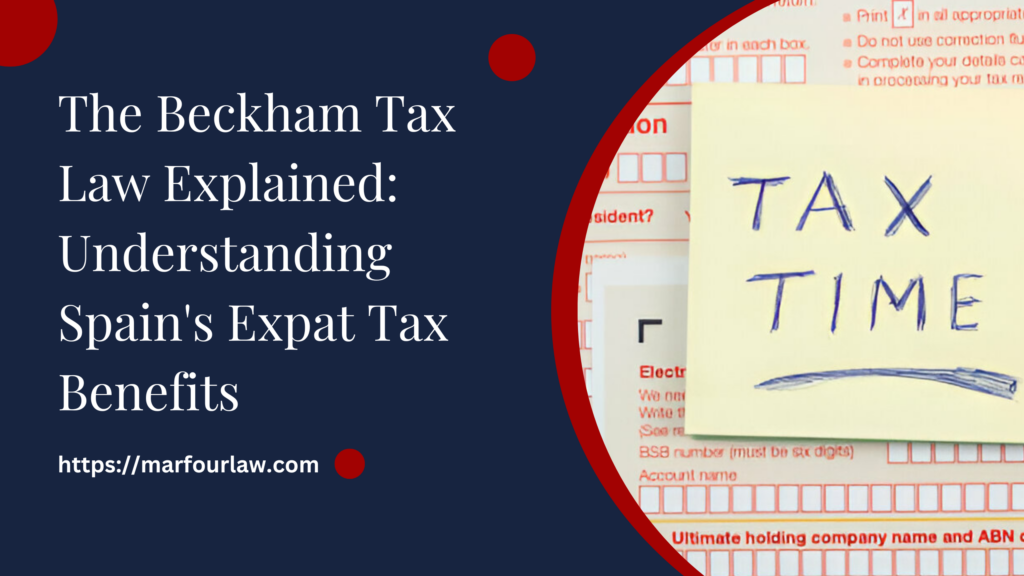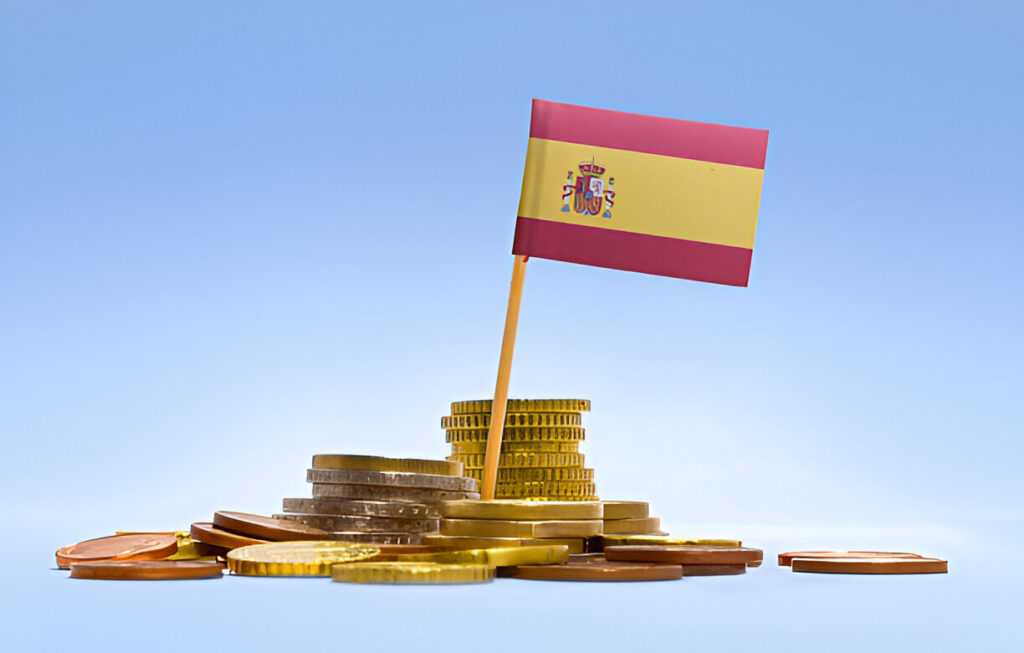Beckham Tax Law
Are you an expat living in Spain? Are you curious about how to manage taxes more efficiently? Enter Ley Beckham, the Beckham Tax Law in Spain.
The Beckham Tax Law Explained: Understanding Spain’s Expat Tax Benefits

This law offers a beneficial expat tax break, easing the burden of wealth tax in Spain for eligible individuals. Let’s delve into how this law simplifies Taxation for expats in Spain.
What is the Beckham Law in Spain?
In Spain, the Beckham Law, formally known as Ley Beckham, is a special tax regulation designed to attract foreign talent, particularly high-net-worth individuals and skilled professionals, to live and work in Spain.
This law offers significant tax benefits to eligible expatriates who relocate to Spain for employment or investment purposes. Let’s delve into the details to understand how the Beckham Law works and its advantages to expats.
1. Understanding the Beckham Tax Law:
The Beckham Law, named after the famous English footballer David Beckham, was introduced in 2005 to encourage foreign nationals, including athletes, executives, and entrepreneurs, to relocate to Spain.
The primary objective was to boost Spain’s economy by attracting foreign investment and talent while simplifying the taxation process for expatriates.
2. Who Can Benefit from the Beckham Law?
Expatriates who meet certain criteria can benefit from the Beckham Law’s tax advantages. These include:
- Non-Spanish Residents: Individuals not considered tax residents of Spain can take advantage of the Beckham Law. This includes foreign nationals relocating to Spain for employment or investment purposes.
- New Residents: Expatriates must become Spanish tax residents within six months of relocating to Spain to qualify for the benefits offered by the Beckham Law.
- Highly Qualified Professionals: The law targets skilled professionals, such as executives, researchers, scientists, and athletes, who contribute to Spain’s economic development.
- Wealthy Individuals: High-net-worth individuals seeking to minimize their tax obligations may benefit from the Beckham Law’s provisions.
3. Taxation in Spain for Expats:
Under the Beckham Law, eligible expatriates enjoy favorable tax treatment compared to regular Spanish residents. Some key aspects of Taxation in Spain for expats under the Beckham Law include:
- Expatriates covered by the Beckham Law are subject to a flat tax rate of 24% on their Spanish-source income, regardless of the total amount earned. This rate applies for the first six years of residency in Spain.
- Expatriates under the Beckham Law are exempt from paying wealth tax on assets located outside of Spain during the first five years of residency.
- Qualified expatriates benefit from simplified tax filing procedures, making it easier to comply with Spanish tax regulations.
4. Advantages of the Beckham Law:
The Beckham Law offers several advantages to expatriates considering a move to Spain:
- One of the most significant benefits of the Beckham Law is the potential for substantial tax savings, especially for high-income individuals. The flat tax rate of 24% can result in lower tax liabilities than the progressive tax rates applicable to regular Spanish residents.
- Expatriates can strategically manage their wealth by taking advantage of the five-year exemption from wealth tax on assets outside of Spain. This allows them to preserve and grow their wealth more effectively.
- The Beckham Law enhances Spain’s appeal as a destination for foreign talent, attracting skilled professionals, entrepreneurs, and investors, contributing to the country’s economic growth and competitiveness.
- The streamlined tax filing process reduces administrative burden and complexity for expatriates, making it easier to comply with Spanish tax laws.
5. Considerations and Limitations:
While the Beckham Law offers significant tax benefits, expatriates should consider certain
- Duration of Benefits: The tax advantages provided by the Beckham Law are available for a limited period. After obtaining Spanish residency, expatriates can benefit from the flat tax rate and wealth tax exemption for up to six and five years, respectively.
- Residency Requirements: To qualify for the Beckham Law’s benefits, expatriates must meet residency criteria and become tax residents of Spain within six months of relocating to the country.
- Wealth Tax Exemption: While expatriates are exempt from paying wealth tax on assets outside of Spain, this exemption only applies for the first five years of residency. After this period, they may become subject to Spanish wealth tax on worldwide assets.
- Individual Circumstances: The suitability of the Beckham Law’s provisions depends on individual circumstances, including income level, asset holdings, and long-term residency plans. Expatriates should seek professional advice to determine the optimal tax strategy.
How Expat Tax Breaks Work in Spain?
Living abroad in Spain comes with its perks, especially regarding taxes. Let’s dive into how expat tax breaks function under the Beckham Law, providing a clearer picture of what it means for your finances.

Understanding Spain’s Expat Tax Breaks:
When you move to Spain as an expatriate, you might qualify for special tax benefits under the Beckham Law. This law allows qualifying expats to be taxed at a fixed rate of 24% on their Spanish income, regardless of their total earnings.
This can lead to significant savings compared to standard tax rates, especially for high-income earners.
Eligibility Criteria for the Beckham Law:
To benefit from the Beckham Law, you need to meet certain criteria. First and foremost, you must have been a Spanish tax resident only a few years before relocating to Spain. Additionally, you must move to Spain for work reasons or be offered employment there. It’s essential to ensure you meet all the requirements to avoid surprises come tax time.
Benefits of the Beckham Law:
Under the Beckham Law, expatriates enjoy several advantages:
- The most significant benefit is the fixed tax rate of 24% on Spanish income, irrespective of your total earnings. This can simplify tax planning and make it easier to budget your finances.
- Expats covered by the Beckham Law are exempt from Spain’s wealth tax on assets outside of Spain for the first five years of residence. This can lead to substantial savings, especially for individuals with significant assets abroad.
- The Beckham Law streamlines the tax process for expats, making it easier to comply with Spanish tax regulations. This can reduce the administrative burden and help expats focus on other aspects of their lives in Spain.
Wealth Tax in Spain: What Expats Need to Know
While the Beckham Law offers significant tax benefits, it’s essential to understand the broader tax landscape in Spain, including wealth tax implications.
Overview of Wealth Tax in Spain
Wealth tax in Spain, also known as Patrimonio, is a tax on the net wealth of individuals. It applies to residents and non-residents and is calculated based on the total value of worldwide assets.
Applicability to Expatriates
As an expatriate in Spain, you may be subject to wealth tax on your global assets if considered a tax resident. However, under the Beckham Law, expats may benefit from a five-year exemption on wealth tax for assets held outside of Spain. This can provide significant relief for individuals with substantial assets abroad.
Implications for Expats
Understanding wealth tax implications is crucial for expatriates moving to Spain. While the Beckham Law offers temporary relief from wealth tax on foreign assets, it’s essential to plan for the eventual expiration of this exemption. Proper tax planning can help expats minimize their tax liabilities and ensure compliance with Spanish tax regulations.
Ley Beckham: Simplifying Taxation for Expats
The Ley Beckham, or Beckham Law, is a valuable tool for expatriates looking to simplify their tax obligations in Spain.
Streamlined Tax Process
One of the key benefits of the Beckham Law is its ability to streamline the tax process for expatriates. By opting into this special tax regime, expats can enjoy a fixed tax rate and exemption from wealth tax on foreign assets, making navigating the complexities of Spanish Taxation easier.
Planning for the future
While the Beckham Law offers immediate tax benefits, expatriates must plan for the future. As the five-year exemption on wealth tax for foreign assets expires, expats may need to reassess their tax strategies and ensure compliance with Spanish tax laws.
Ley Beckham: Your Guide to Tax Savings
The Beckham Law, officially known as Ley Beckham, is a special tax regime in Spain designed to attract skilled professionals, entrepreneurs, and investors from abroad.
It offers significant tax benefits to expatriates residing in Spain, making it an attractive destination for those considering relocation. Let’s delve deeper into how this law works and the tax savings it can offer to expats.
Who Benefits from the Beckham Law?
Under the Beckham Law, expatriates who relocate to Spain for work or investment can enjoy favorable tax treatment. This law particularly benefits high-net-worth individuals, professionals, and retirees looking to minimize their tax burden while residing in Spain.
Tax Breaks for Expats: Explaining the Benefits
- Income Tax Reductions: Expatriates covered under the Beckham Law are subject to a flat income tax rate of 24% on their Spanish-source income for the first six years of residency. This is significantly lower than Spain’s standard income tax rates, ranging from 19% to 45%. This reduction in income tax can result in substantial savings for expats.
- Exemption from Wealth Tax: Wealth tax, or patrimonio, is levied on the net wealth of individuals in Spain. However, under the Beckham Law, expatriates are exempt from paying wealth tax on assets outside Spain.
- Simplified Taxation Process: The Beckham Law simplifies the taxation process for expatriates by offering a flat tax rate and exemptions from certain taxes.
Qualifying for the Beckham Law
To benefit from the tax savings offered by the Beckham Law, expatriates must meet certain eligibility criteria
- Residency Requirement: Expatriates must obtain residency status in Spain to qualify for the Beckham Law. This typically involves obtaining a residence visa and registering with the Spanish authorities.
- Not Having Been a Spanish Resident in the Previous 10 Years: To be eligible for the Beckham Law, expatriates must not have been a tax resident of Spain for ten years before relocating to the country. This requirement ensures that the tax benefits are targeted toward new residents.
- Proof of Employment or Investment Activity: Expatriates must demonstrate that they are either employed in Spain or engaged in investment activities in the country to qualify for the Beckham Law.
Managing Wealth Tax in Spain
While expatriates covered under the Beckham Law are exempt from wealth tax on assets held outside of Spain, they may still be subject to wealth tax on assets located within the country.
Wealth tax in Spain is levied on the net wealth of individuals, including real estate, financial assets, and personal property.
To manage wealth tax obligations in Spain, expatriates should:

Understand Taxable Assets:
Expatriates should familiarize themselves with the types of assets subject to wealth tax in Spain. This can include real estate, bank deposits, investments, and valuable personal property.
Take Advantage of Deductions and Exemptions:
While wealth tax is levied on individuals’ net wealth, certain deductions and exemptions can reduce taxable wealth. Expatriates should explore these options to minimize their wealth tax liability.
Plan for Taxation:
Expatriates should engage in proactive tax planning to manage their wealth tax obligations in Spain. This may involve structuring investments and assets tax-efficiently and seeking advice from financial and tax professionals.
Maximizing Tax Savings with the Beckham Law:
In conclusion, the Beckham Law offers significant tax savings for expatriates relocating to Spain for work or investment purposes. By taking advantage of the favorable tax treatment provided under this law, expatriates can minimize their tax burden and maximize their disposable income.
However, expatriates must understand the eligibility criteria and comply with their tax obligations to benefit fully from the Beckham Law’s tax-saving opportunities.
With careful planning and guidance, expatriates can navigate the complexities of Taxation in Spain and enjoy a financially rewarding experience living and working there.
Wealth Tax in Spain: Understanding Taxes on Wealth for Expats
In Spain, residents are subject to wealth tax on their worldwide assets, including real estate, bank accounts, investments, and other valuables. However, the regulations may differ for expats, offering potential benefits under certain circumstances.
Who is Subject to Wealth Tax in Spain?
- Residency Status: Spanish tax laws typically apply to residents, but non-residents who own assets in Spain may also be subject to wealth tax.
- Thresholds and Exemptions: Spain offers exemptions and deductions based on the value of assets and personal circumstances. For example, Ley Beckham, or the Beckham Law, provides tax benefits for qualifying expatriates.
Applicability and Benefits of Ley Beckham:
- Eligibility Criteria: To qualify under Ley Beckham, expatriates must meet specific requirements, including not being a Spanish tax resident in the ten years preceding their relocation and engaging in employment or entrepreneurial activities in Spain.
- Tax Benefits: Under Ley Beckham, qualifying expatriates may enjoy significant tax advantages, such as a flat income tax rate of 24% for the first six years of residency, irrespective of income source.
Navigating Wealth Tax for Expats Under Ley Beckham
Expatriates covered by Ley Beckham may benefit from certain asset exemptions or reductions, mitigating their wealth tax liability. These exemptions include business assets, primary residences, and certain financial instruments.
Beckham Tax Law: Making Taxes Easier in Spain
In Spain, the Beckham Tax Law, officially known as Ley Beckham, is designed to simplify Taxation for expats, offering them certain advantages and tax breaks. Let’s delve into how this law works and how it benefits expatriates living in Spain.
Benefits of the Beckham Law for Expats
Living as an expat in Spain has perks, especially regarding taxes. The Beckham Law, officially known as Ley Beckham, offers significant advantages to expatriates residing in Spain.
Let’s delve into its various benefits and how it makes Taxation in Spain more manageable for expats.
1. Reduced Tax Rates under the Beckham Law:
Under the Beckham Law, expatriate expats in Spain can benefit from reduced income tax rates. This means they may pay less taxes than Spanish residents, who are subject to higher tax rates.
These reduced tax rates can significantly ease the financial burden for expatriates and make Spain a more attractive destination for living and working.
Understanding Taxation on Income:
Income taxation in Spain for ex-patsexpats follows a progressive scale, where the tax rate increases with higher income levels. However, under the Beckham Law, expatriates may be eligible for a flat tax rate of 24%, regardless of their income level.
This flat rate provides a clear and predictable tax structure, simplifying the tax filing process for expats.
Exemption from Wealth Tax:
Wealth tax, or patrimonio, is levied on the net wealth of individuals in Spain. Expats residing in Spain may be subject to this tax on their worldwide assets.
However, under the Beckham Law, expatriates can benefit from an exemption from wealth tax for a specified period, providing relief from additional tax obligations on their assets.
2. Streamlined Tax Residency Requirements:
Determining tax residency status can be complex for expatriates living in Spain, especially those with ties to multiple countries. However, the Beckham Law simplifies this process by providing clear criteria for tax residency.
Expats who qualify under the Beckham Law are considered non-residents for tax purposes, regardless of their stay in Spain.
Residency Criteria under the Beckham Law:
To qualify for tax benefits under the Beckham Law, expatriates must meet certain residency criteria. These criteria typically include not having been a tax resident in Spain for the previous ten years and relocating to Spain for employment or business purposes. By meeting these criteria, expats can benefit from the favorable tax treatment the Beckham Law provides.
Exemption from Worldwide Income Taxation:
One of the significant advantages of the Beckham Law is the exemption from worldwide income taxation for qualifying expatriates. Unlike Spanish residents taxed on their global income, expats under the Beckham Law are only taxed on their income earned within Spain.
This exemption simplifies tax obligations for expatriates and reduces the administrative burden associated with reporting foreign income.
3. Flexibility in Tax Planning:
The Beckham Law offers expatriates flexibility in tax planning, allowing them to optimize their tax obligations and maximize their savings.
Expats can strategically structure their income and assets to take full advantage of the law’s benefits, ensuring they pay the lowest tax legally permissible under Spanish law.
Tax Optimization Strategies:
Under the Beckham Law, expatriates can employ various tax optimization strategies to minimize their tax liabilities. These strategies include structuring income in a tax-efficient manner, taking advantage of available deductions and exemptions, and utilizing tax-deferred investment vehicles.
By implementing these strategies, expatriates can optimize their tax planning and retain more of their hard-earned income.
Professional Tax Advice:
Navigating the intricacies of tax planning can be challenging, especially in a foreign country like Spain. Therefore, seeking professional tax advice is crucial for expatriates looking to optimize their tax obligations under the Beckham Law.
Tax professionals with expertise in international Taxation can provide personalized guidance tailored to expatriates’ unique circumstances, ensuring compliance with Spanish tax laws while maximizing tax savings.
Taxation in Spain: A Quick Guide for Expats
Taxation in Spain operates on a progressive scale, meaning the more you earn, the higher the percentage of tax you pay. Expats living in Spain are subject to various taxes, including income, wealth, and property taxes.

Income Tax in Spain
Income tax, also known as Impuesto sobre la Renta de las Personas Físicas (IRPF), is levied on the income earned by individuals in Spain. The tax rates range from 19% to 47%, depending on the income bracket. Expats should be aware of any tax treaties between Spain and their home country to avoid double Taxation.
Wealth Tax in Spain
Wealth tax, or Impuesto sobre el Patrimonio, is a tax on individuals’ net wealth. It applies to residents and non-residents and is calculated based on the total value of assets owned, including property, savings, investments, and more.
However, Ley Beckham offers tax breaks to eligible expats, reducing the tax burden on their worldwide assets.
Property Tax in Spain
Property tax, or Impuesto sobre Bienes Inmuebles (IBI), is an annual tax levied on real estate ownership in Spain. The tax rate varies depending on the location and value of the property. Expats should budget for this tax when purchasing or renting property in Spain.
Mar four Tax Services Guide for Expats in Spain
Navigating the intricacies of Taxation in Spain can be challenging for expats. However, with professional tax services like Marfour Tax Services, expats can receive expert guidance and support to ensure compliance with Spanish tax laws while maximizing tax benefits.
Marfour Tax Services offers a range of services tailored to the needs of expats, including:
- Tax Planning: Strategizing to minimize tax liabilities and optimize financial resources.
- Compliance Assistance: Ensuring expats meet their tax obligations and deadlines in Spain.
- Ley Beckham Consultation: Providing guidance on eligibility and benefits under the Beckham Law.
By partnering with Marfour Tax Services, expats can confidently navigate the complexities of Taxation in Spain, allowing them to focus on enjoying their life and career in their new home.
In conclusion, understanding Taxation in Spain is essential for expats to effectively manage their finances and ensure compliance with Spanish tax laws.
With the benefits offered by Ley Beckham and the support of professional tax services like Marfour, expats can navigate the tax landscape in Spain with ease and peace of mind.
FAQs
As an expat in Spain, I understand that the tax system is essential for financial planning and compliance. Here are answers to some commonly asked questions about Taxation in Spain:
What is the Beckham Law in Spain, and how does it benefit expats?
The Beckham Law, officially known as Ley 35/2006, offers a special tax regime for expats relocating to Spain.
It allows eligible expats to opt for a flat income tax rate of 24% for the first six years of residency, regardless of their income outside Spain. This provides significant tax savings for expats and simplifies the tax filing process.
Am I required to pay wealth tax in Spain as an expat?
Yes, expats living in Spain are subject to wealth tax, known as Impuesto sobre el Patrimonio. This tax applies to the total value of worldwide assets, including property, savings, investments, and more. However, expats eligible for the Beckham Law are exempt from paying wealth tax on assets outside of Spain during the first six years of residency.
What are the tax rates for income tax in Spain?
Income tax in Spain, known as Impuesto sobre la Renta de las Personas Físicas (IRPF), is levied on a progressive scale ranging from 19% to 47%. The tax rates vary depending on the income bracket, with higher earners subject to higher tax rates.
Expats should consult with tax professionals to understand their tax liabilities based on their income level and residency status.
How does property tax work for expats in Spain?
Property tax in Spain, known as Impuesto sobre Bienes Inmuebles (IBI), is an annual tax levied on real estate ownership. The tax rate is determined based on the location and value of the property. Expats who own property in Spain are responsible for paying this tax, contributing to local government revenues and services.
What are the eligibility criteria for Ley Beckham?
To qualify for Ley Beckham, expats must meet certain criteria, including becoming tax residents of Spain and not having been a resident in the previous ten years.
Conclusion
In conclusion, understanding the taxation system in Spain is crucial for expats to navigate their financial responsibilities effectively. Beckham Law provides significant tax benefits for eligible expats, offering a simplified and favorable tax regime.
With proper knowledge and guidance from professionals like Marfour Tax Services, expats can maximize tax savings and ensure compliance with Spanish tax laws, allowing them to enjoy their lives and careers in Spain with confidence.
One of the most advantageous tax laws for expats in Spain is the Beckham Law, which gives expats important benefits.
The Beckham Law, known as the “Régimen Especial de Trabajadores Desplazados,” is a special tax regime for expatriates or displaced workers. It was approved in 2014.
This law is named after the former English football player David Beckham because he was the first one to benefit from it.
This law allows workers to change their tax residency and be taxed as non-residents at the general rate of 24% (instead of the general scale ranging from 19%-45%) for their first year of arrival as well as the following five years.
Our tax attorneys in Spain can help you benefit from this law as soon as you arrive in Spain.
Beckham Tax Law cases
Clients assisted
%
clients satisfied
What Are The Main Requirements Of This Law?
- You have not resided in Spain for the last ten years.
- You moved to Spain because you were offered an employment contract or are earning income as an entity administrator.
- You do not have income from a permanent establishment located in Spain.
Note that this regime DOES NOT APPLY TO THE FOLLOWING PROFESSIONALS:
- Self employed workers.
- Sports professionals.
- Directors of entities who are owners and own a considerable part of the company.
One of the most frequently asked question by our clients:
Can I get benefits from the Double Taxation agreement and from the Beckham Law?
This option is rather limited. Nonetheless, our Spanish Tax lawyers will first need to assess your case to provide a response tailored to your personal situation.
Do not hesitate to contact us to see if your case qualifies for this law.
testimonials
![]()
![]()
MARFOUR ASSISTS YOU IN BENEFITING FROM THE BECKHAM LAW
Contact us, and Marfour International Law Firm will assist you in benefiting from the Beckham Tax Law. One of our specialized English-speaking lawyers will contact you immediately. Do not hesitate to send us your enquiry.

